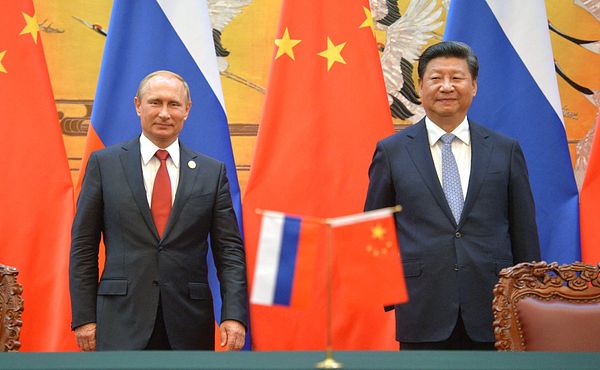China and Russia on Sunday voiced their shared opposition to unipolar hegemony during Chinese State Councilor and Foreign Minister Wang Yi’s meeting with the new Russian Ambassador to China, Igor Morgulov, in Beijing.
Wang said both China and Russia are committed to a multipolar world, not unipolar hegemony, and to the international system with the United Nations at its core and international order underpinned by international law, not power politics.
“This stance is on the right side of history and in line with the trend of the times,” he said, adding that the two neighbors should deepen strategic trust and pragmatic cooperation, further the China-Russia comprehensive strategic partnership of coordination and maintain international fairness and justice.
Both countries should also preserve the peace and stability of the region and the world at large, said the Chinese foreign minister.
Morgulov echoed Wang’s remarks, saying Russia is committed to rejecting unipolar hegemony with China and jointly maintaining international order underpinned by international law and the UN Charter.
A former deputy foreign minister, Morgulov was appointed as Russia’s new ambassador to Beijing in September, taking over the role from Andrey Denisov, who had been Moscow’s chief envoy in Beijing since 2013.
You may recall that, Russian Defense Minister Sergey Shoygu claimed that the unipolar world has ended, saying Moscow’s “special military operation” marked the era of transit to the multipolar structure.
Speaking at the 2022 Moscow Conference on International Security, Shoygu said Russia does not need nuclear weapons to achieve military goals in Ukraine, and the country’s military doctrine clearly defines the cases of nukes use — the extraordinary circumstances that threaten the existence of the state.
According to Shoygu, the West accuses Russia of non-existing threats to divert attention from activities of prohibited military biological research in Ukraine.
Shoygu thanked the UN and the International Committee of the Red Cross for the depoliticized cooperation in Ukraine.
The minister said Russia’s “special military operation” made NATO reveal its true nature, the alliance stopped “hiding” behind words about “defensive character,” and openly formulated its basic documents, spreading interests to Africa, the Middle East, and Asia-Pacific.
Shoygu argued that the events in Ukraine are reasonable ground for Finland and Sweden to join NATO, recalling that the two countries had been drifting to the organization for years.
He warned that the deployment of the North Atlantic forces and weapons in the Scandinavian countries will trigger Moscow’s counteraction.
The military chief also said the Russian specialists are carefully studying the Western weapons that have been captured in Ukraine, noting that these arms failed to change the course of the battles.
Shoygu criticized the Organization for the Security and Cooperation in Europe for taking a biased approach toward Russia, noting that the body was created as a platform for dialogue.
READ ALSO: Israeli Apartheid ‘Not welcome’ at Qatar World Cup
He also opposed the Western approach of splitting the world into authoritarian and democratic parts, with the general idea of the possibility of using the most severe measures, including force against the “autocrats.”
The defense minister called US House Speaker Nancy Pelosi’s visit to the “partially recognized state of Taiwan” a provocation,” qualifying it as “a step aiming to destabilize” the situation in the Asia-Pacific region.
Shoygu said the AUKUS alliance may turn into “Asian NATO,” which means new challenges for Russia in its Far East region.
The AUKUS is a security pact involving the US, UK, and Australia signed last year under which Canberra will get nuclear-powered submarines.
He said that despite all the attempts, Western domination is becoming a thing of the past.
While the West goes to extremes in its endeavor to preserve the global hegemony, the situation in the world remains tense, Shoygu said.
He listed Afghanistan and the Middle East as places where terrorists may try to take revanche and regain their positions.
The Russian “special military operation” in Ukraine put an end to the Western hegemony in the world, it will take some time for a multipolar order to adjust but it is already a reality, he noted.
“A multipolar world is the reality of today. The transition from the dominance of one global leader to several centers of attraction is not easy, but it creates real conditions for the development of sovereign states,” Shoygu said.
Original Post













